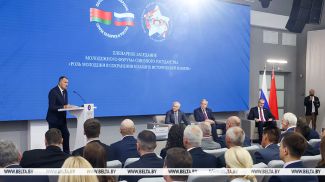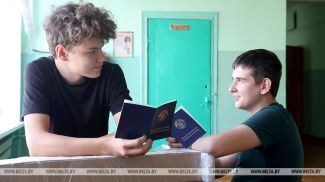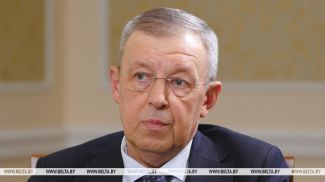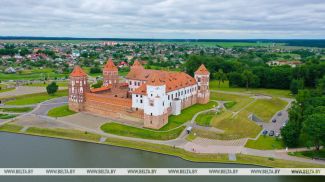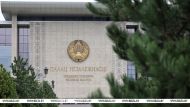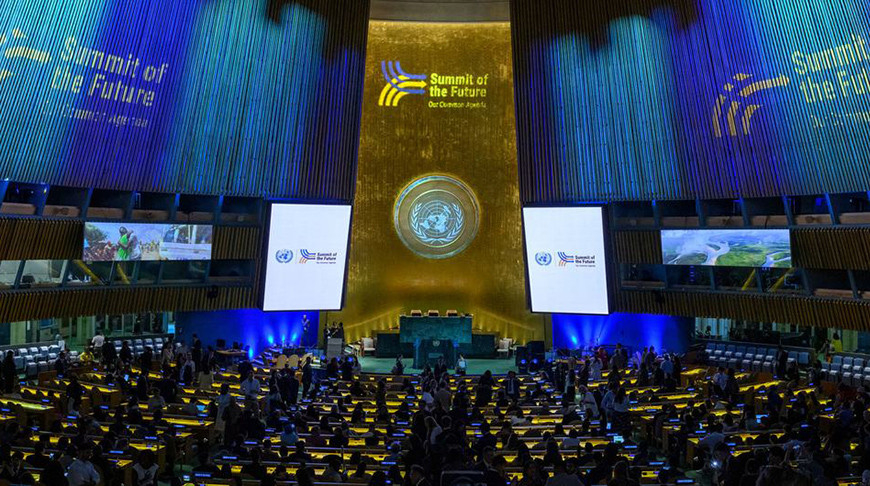
Photo courtesy of news.un.org
MINSK, 23 September (BelTA) - Belarus has always been a peace-loving state that values good-neighborly relations and friendship between peoples, Deputy Chairman of the Council of the Republic, National Coordinator for the Sustainable Development Goals Sergei Khomenko said at the UN Summit of the Future in New York, BelTA has learned.
“Belarus is a country located in the very center of Europe, populated by peaceful, hard-working people with their own values and native traditions. Belarus has a centuries-old history, which, unfortunately, has tragic moments. Next year all progressive mankind will celebrate the 80th anniversary of the Victory over fascism. Belarus experienced all the horrors of that war. Our country was occupied for 1,101 days. The Belarusian people were subjected to genocide. Every third Belarusian was tortured and killed. More than 200 towns and 9,000 villages were burnt and destroyed. We survived!” Sergei Khomenko said. “Thanks to the contribution of our people to the Great Victory, Belarus has become one of the founding countries of the United Nations, the main goal of which is to maintain peace in the world and develop friendly relations between all countries.”
Belarus has always been and remains a peace-loving state that cherishes good-neighborly relations and friendship between peoples, the vice speaker said. “Only through joint efforts, respecting each other, we are able to ensure peace and security on our planet Earth,” Sergei Khomenko stressed.
Deputy Chairman of the Council of the Republic Sergei Khomenko and Chairman of the Standing Committee on International Affairs and National Security of the Council of the Republic Sergei Aleinik are taking part in the UN Summit of the Future on 22-23 September. The summit is a high-level event where world leaders gather to forge a new international consensus on how to achieve a better present and safeguard the future. Effective global cooperation is increasingly important to our survival, but it is difficult to achieve in a climate of mistrust and using outdated structures that no longer reflect contemporary political and economic realities. This once-in-a-generation event is an opportunity to demonstrate that international cooperation can effectively achieve agreed goals, overcome emerging threats and seize opportunities.
“Belarus is a country located in the very center of Europe, populated by peaceful, hard-working people with their own values and native traditions. Belarus has a centuries-old history, which, unfortunately, has tragic moments. Next year all progressive mankind will celebrate the 80th anniversary of the Victory over fascism. Belarus experienced all the horrors of that war. Our country was occupied for 1,101 days. The Belarusian people were subjected to genocide. Every third Belarusian was tortured and killed. More than 200 towns and 9,000 villages were burnt and destroyed. We survived!” Sergei Khomenko said. “Thanks to the contribution of our people to the Great Victory, Belarus has become one of the founding countries of the United Nations, the main goal of which is to maintain peace in the world and develop friendly relations between all countries.”
Belarus has always been and remains a peace-loving state that cherishes good-neighborly relations and friendship between peoples, the vice speaker said. “Only through joint efforts, respecting each other, we are able to ensure peace and security on our planet Earth,” Sergei Khomenko stressed.
Deputy Chairman of the Council of the Republic Sergei Khomenko and Chairman of the Standing Committee on International Affairs and National Security of the Council of the Republic Sergei Aleinik are taking part in the UN Summit of the Future on 22-23 September. The summit is a high-level event where world leaders gather to forge a new international consensus on how to achieve a better present and safeguard the future. Effective global cooperation is increasingly important to our survival, but it is difficult to achieve in a climate of mistrust and using outdated structures that no longer reflect contemporary political and economic realities. This once-in-a-generation event is an opportunity to demonstrate that international cooperation can effectively achieve agreed goals, overcome emerging threats and seize opportunities.




